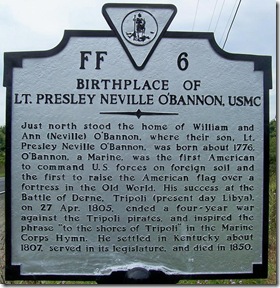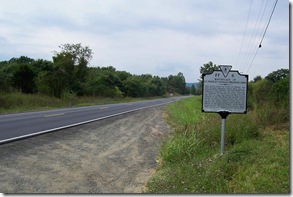 Marker No. FF-6
Marker No. FF-6
Fauquier County, VA
Marker Text: Just north stood the home of William and Ann (Neville) O'Bannon, where their son, Lt. Presley Neville O'Bannon, was born about 1776. O'Bannon, a Marine, was the first American to command U.S. forces on foreign soil and the first to raise the American flag over a fortress in the Old World. His success at the Battle of Derne, Tripoli (present day Libya), on 27 Apr. 1805, ended a four-year war against the Tripoli pirates, and inspired the phrase "to the shores of Tripoli" in the Marine Corps Hymn. He settled in Kentucky about 1807, served in its legislature, and died in 1850.
Location: On County Route F-185 (Grove Lane), One mile west of Marshall, northwest of Interstate 66, Exit 27 on the north side of the road. Erected by the Department of Historic Resources in 1996.
Today is the 237th Anniversary of the founding of the U.S. Marine Corps. The United States Marine Corps abounds with tradition and history. An important aspect of this history and tradition revolves around Presley Neville O'Bannon. Over two hundred years ago, O'Bannon, a Virginian born in Fauquier County in 1776, became the first American to raise the United States' flag over foreign soil on April 27, 1805 during the Barbary Wars.
Photo taken looking west on Co. Route F-185, just north of exit 27 from Interstate 66. Click any photo to enlarge.
Presley Neville O'Bannon was named for his cousin, who had been an American officer in the Revolutionary War, served as the aide-de-camp to General Marquis de Lafayette and married to the daughter of General Daniel Morgan.
In Tripoli (now Libya) and the Barbary Coast "pirates" had raided shipping in the Mediterranean Seas for years, exacting tribute in return for not attacking ships of a given nation, or seizing ships and sailors and selling them into slavery. Before American Independence, American ships had enjoyed the protection of the British Navy, but after independence, America was forced to pay tribute to avoid pirates, it was determined that it was less costly to pay the tribute then to respond with military action.
On May 14, 1801, the Pasha of Tripoli, Yusat Karamanli, demanded additional tribute, and when refused, he declared war against the United States. This led to a declaration of war by the United States and more warships being dispatched to the Mediterranean. During a storm, one of these, frigate Philadelphia, went on the rocks off Tripoli, with her crew being captured and imprisoned at Derne.
 This event and the inability of U.S. agents to ransom the crew of Philadelphia led to the formation of a bold rescue plan, which included Lt. O’Bannon. The plan, conceived by naval agent William Eaton, proposed the formation of an alliance with Hamet, elder brother of Yousuf. Lieutenant Presley O'Bannon, Marine officer assigned to the “USS Argus”, took seven marines and marched with Hamet and 500 of his men and marched 520 miles across the Desert of Barca from Alexandria, Egypt to attack the city of Derna, Tripoli's eastern provincial capital, arriving on April 25, 1805. When O'Bannon demanded Yusat to surrender, after Yusat refused, O'Bannon led a daring frontal assault on the harbor fort, raising the American Flag over the fort after two hours of hard fighting. This was the first time the Stars and Stripes had been raised on foreign soil.
This event and the inability of U.S. agents to ransom the crew of Philadelphia led to the formation of a bold rescue plan, which included Lt. O’Bannon. The plan, conceived by naval agent William Eaton, proposed the formation of an alliance with Hamet, elder brother of Yousuf. Lieutenant Presley O'Bannon, Marine officer assigned to the “USS Argus”, took seven marines and marched with Hamet and 500 of his men and marched 520 miles across the Desert of Barca from Alexandria, Egypt to attack the city of Derna, Tripoli's eastern provincial capital, arriving on April 25, 1805. When O'Bannon demanded Yusat to surrender, after Yusat refused, O'Bannon led a daring frontal assault on the harbor fort, raising the American Flag over the fort after two hours of hard fighting. This was the first time the Stars and Stripes had been raised on foreign soil.
In honor of his heroism in the battle for Derna, Hamet Karamanli presented O'Bannon a jeweled sword with a scimitar with a Mameluke hilt which became the model of sword still used by the United States Marine Corps. Not to be outdone, the General Assembly of the State of Virginia passed a resolution on December 26, 1805, to present their native son "a handsome sword with such appropriate device thereon as they may think proper."
O'Bannon wrote to Governor George William Smith on July 4, 1811 that he intended to visit Richmond in the fall, however, the completed sword was not presented to O'Bannon until October 1812 in Alexandria, Virginia. The presentation sword from the State of Virginia currently housed in the National Museum of the Marine Corps in Quantico, Virginia.
Hailed as the “hero of Derne,” Lt. O’Bannon retired from the Marine Corps on March 6, 1807 and moved to Logan County, Kentucky and served in the Kentucky State Legislature from 1812 to 1820. He died on September 12, 1850 at the age of 74. In 1919, his remains were removed to the State Cemetery in Frankfort, Kentucky, where a monument is erected in his memory. O'Bannon's legacy is memorialized by the words "to the shores of Tripoli" being a part of the Marine Corps Official Song, and his Mameluke sword, presented to him by Hamet, has become a standard for Marine Officers since 1825. In addition, the United States Navy has named in its history three destroyers after him.

No comments:
Post a Comment